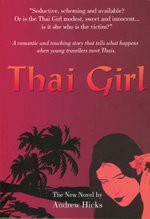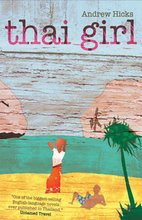

I can hardly believe that in my hand I'm holding a book of 250 pages with 115 photographs that's all about the five years I've lived in Thailand with Cat. Writing about myself is the last thing I'd choose to do, but really it's about her, her village, her country. They are my inspiration.
I started writing it when we'd been together about two years. I went back to my diaries and I racked my brains but it wasn't difficult as I had a vivid recall of the many special experiences we'd shared together. I wanted to write about Isaan, the dry North East of Thailand where we live among the rice fields and that's exactly what I've done.
I hope it's funny and I hope it's fair. I hope that it portrays the agonies and the ecstacies of reinventing oneself and finding a new life in a context I could never before have imagined I'd find myself in. And it's about a very special relationship and of building bridges across our vast differences of culture and age.
So how hard is it to retire in Thailand in the bosom of a Thai family and to find happiness then? Well, you'll have to read the book to find out!
I loved every moment of the writing but the final editing and proof reading, creating the book itself has been hard work. I've twice travelled nine hours to Bangkok, the first time spending seventeen days there dealing with all the work of design and production.
My designer Khun Nont, a Thai fluent in both English and German was unbelievably patient and we sat at his computer for no less than fifty hours, doing the design and typesetting, piecing every photo into the page so that it directly related to the adjacent text. My eyes are still sore.
The book is distributed throughout Thailand by ASIA BOOKS who have given me an enormous amount of their time and been so very helpful. They now have 1,200 copies in shops round Thailand which means that if there's an average of four copies in each, it's for sale in 300 outlets which is amazing. Even so if it's not in your book shop, get them to order it from www.asiabooks.com or go direct to their customer services by email.
I'm now back home again in the village and am sending out a few press releases in the hope of some reviews. The most difficult thing is writing a blurb about one's own book but I've tried and I've pasted in the PRESS RELEASE below to see what you say about it.
Cat's not qute sure what she thinks about people reading about our life together. I'm not too sure either but I've gone and done it and we're now about to find out. This is the first publicity for the book but, like dropping a coin down a deep well, I don't really expect anything much to happen at all.
Only time will tell!
PRESS RELEASE
“My Thai Girl and I” by Andrew Hicks
This new book about the author’s life in Thailand has been distributed by Asia Books to bookshops and outlets throughout Thailand as from early April 2008.
Written by Andrew Hicks, author of the best selling novel, “Thai Girl”, it is expected to sell to readers looking for an accessible story about expat life that also informs about the local culture and living in rural Thailand.
Review Copies are available on request to… arhicks56@hotmail.com .
See also www.thaigirl2004.blogspot.com
www.thaigirl2004.com.
The author will be pleased to assist with any interview, media review or feature about the book.
ISBN 978-974-9898-90-1 250 pages including 8 colour pages with 20 photographs and 95 monochrome photographs in the text.
The Blurb on the Back Cover
“This is how I met Cat, a ‘Thai girl’ half my age and how we set up home together in her village out in the rice fields of North Eastern Thailand.
I’ll tell you of toads in the toilet, of ants’ eggs for breakfast, how we took up frog farming and how I got married without really meaning to.
It’s also a book about the countryside, of the old Thailand where the rhythm of the seasons and belief in the spirits and Buddhism remain strong.
Though how could I, a greying English lawyer, ever fit into the lives of a Thai rice farming family. Can Cat and I with our many differences really be compatible?
If you’re curious to know what it’s like to start a totally new life as I did, to slow down and ‘go with the flow’, I’m sure you’ll enjoy reading the story of ‘my Thai girl and I’.”
Five Brief Reviews of the Book for Free Publication
This new book tells the story of how the author, a former law professor set up home in an Isaan village with a rice farmer’s daughter half his age. With all their incompatibilities and the many problems of adapting to rural life, how could such a relationship ever succeed. A funny and engaging tale, it shows that anything is possible if Andrew throws off his cultural assumptions and learns to go with the flow.
Available at Asia Books and Bookazine and all good bookshops. Price 450 baht.
****
There are many ‘culture shock’ handbooks written for foreigners settling in Thailand but another way to get an authentic flavour of living in the Kingdom is to read a new book just released called, “My Thai Girl and I”. Written by Andrew Hicks, author of the successful novel, “Thai Girl”, it describes how he met his Thai wife Cat and how they set up home together in her village in the North East of Thailand.
The many lessons to be learned are amusingly told, that smiles can mean a thousand things, that yes can sometimes mean no and nothing is ever what it seems. Building a new house involves a thousand crises and compromises and running a thirty year old jeep can turn into a nightmare.
Lavishly illustrated, this is the story of five years in the lives of two people who are as different as can be but offer each other the same thing, namely a totally new start in life. For the author, an older man used to the comforts of city living, there are many lessons to be learned and moving to live in the real rural Thailand presents many challenges.
How Andrew coped with these challenges, struggled with his own cultural assumptions and learned ‘to go with the flow’ will amuse and enlighten those who long for a slower way of life and contemplate retirement in Thailand.
At Asia Books and all good bookshops throughout Thailand. Price 450 baht.
****
In many Isaan villages the ageing farang resident married to a local girl has become a familiar sight. It’s hard though to imagine the reality of these unusual relationships, but a new book now gives the inside story. In “My Thai Girl and I”, Andrew Hicks, author of the best selling novel, “Thai Girl” tells how he met his Thai wife, Cat and how they set up home together in her village in Isaan.
He describes the tortuous business of building a house, of maintaining a thirty year old jeep and all the difficulties of a new life in a very rural environment. How could a sixty year old former corporate lawyer possibly come to grips with the volcanic local food and culture and co-exist with an army of in-laws that he can’t even speak to.
Fully illustrated, “My Thai Girl and I” is a pleasant read that takes the armchair traveler on a quest that is both funny and informative about cross-cultural relationships, the rhythms of the seasons and life in a rice growing village in Surin.
Available from Asia Books, Bookazine and good bookshops throughout Thailand. Published by Konstrukt Books, 450 baht.
****
What’s the story behind the smart new concrete house that’s just been built in a remote village in Isaan? Who’s the tall farang often to be seen drawing wads of money at the ATM in the local town?
A new book, “My Thai Girl and I” now tells the inside story of how one Englishman retired from the rat race and came to accept a much slower way of life with a family of rice farmers in Surin.
Its author, Andrew Hicks tells how he met his Thai wife, Cat and of his culture shock when first she took him to her village. A former corporate lawyer and academic, how would he succeed in adapting to so different a life out in the remote rice fields of Surin?
He tells of the discomforts of living with no bed, no chair, no news of the outside world and with no way to get out of the village except by bicycle. An old Asia hand, he nonetheless finds the local diet of ants eggs and fermented fish spiced up with volcanic chili more than challenging.
The story takes you through five years of his life with Cat and describes the problems of building a house and of keeping a thirty year old jeep on the road and how their relationship confronted the strains and pitfalls of an unusual cross-cultural marriage.
The book thus offers the reader an upbeat and amusing read, with many insights into life for a newcomer to rural Thailand. For Andrew it wasn’t always easy, but ultimately life with his ‘Thai girl’ allowed him to look for a new balance in his life and to learn ‘to go with the flow’.
Fully illustrated, the book is now available at bookshops throughout Thailand. Distributed by Asia Books, price 450 baht.
****
Thailand offers an enticing haven for European men wanting to retire to a warm and welcoming climate and huge numbers seem to be flocking this way. The food is amazing, the cost of living is reasonable and the ladies do really know how to smile. Some of these men succeed in finding happiness but theirs isn’t always an easy path.
In “My Thai Girl and I”, author Andrew Hicks describes some of the pitfalls that can be encountered along the way. Ants eggs for breakfast and toads in the toilet are the least of his troubles and with his energetic wife, Cat, life is a roller coaster as they deal with the stresses of marriage and the cultural gulf that separates them.
After life as a lawyer in London, Hong Kong and Singapore, Andrew finds a small village in Isaan takes some getting used to. He discovers that he’s not only married his wife but her family too, her village even and that their collective way of life is in stark contrast to the individuality of the West.
Andrew describes the problems of building a home, of running a thirty year old jeep and most difficult of all, his isolation from his own world; from world news, family, food, language and culture. How can two people of such differing age and experience possibly make a life together?
The book tells of all the ups and downs of a cross-cultural relationship and, drawing on the humour of the author’s predicament, offers the reader an upbeat and amusing read whose conclusion is distinctly positive.
Available at Asia Books and Bookazine and all bookshops throughout Thailand.
Published by Konstrukt Books, price 450 baht.











